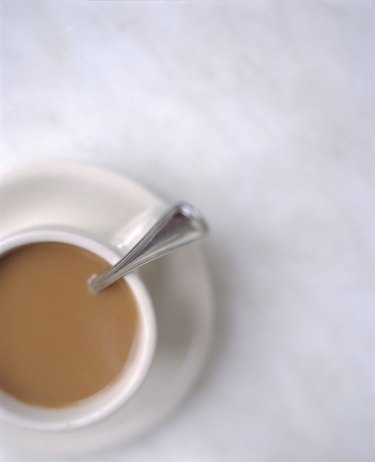
Beta-blockers are commonly prescribed for a wide range of medical issues including heart disease and hypertension. The type of beta-blocker prescribed determines whether you should eliminate caffeine and alcohol from your diet while you are on the medication. Consult your doctor for medical advice tailored to your own circumstances.
Uses of Beta-blockers
Video of the Day
Beta-blockers are used to treat congestive heart failure, the chest pain known as angina, and the abnormal heart rhythms known as arrythmia. Beta-blockers are also used in the treatment of hypertension or high blood pressure, and may be used to prevent future heart attacks in patients who have experienced at least one heart attack. MayoClinic.com indicates that beta-blockers are also used to treat migraines, anxiety disorder, certain tremors, glaucoma and hyperthyroidism.
Video of the Day
How Beta-blockers Work
Beta-blockers function by blocking the effects of adrenaline on the beta receptors in your body. When adrenaline effects are blocked, your nerve impulses are slowed. For cardiac care, slowed nerve impulses make your heart need less oxygen and blood. Beta-blockers can also combat arrhythmia in your heart. There are two main beta receptors in your body, known as beta 1 and beta 2. Beta 1 receptors govern the strength of your heartbeat and your pulse rate. Beat 2 receptors govern muscles which control your bodily functions. Beta-blockers may be selective -- working on both beta 1 and beta 2 receptors -- or non-selective, working on both.
Beta-blockers and Alcohol
Alcohol can decrease the effects of beta-blockers, according to the Texas Heart Institute. You should not drink alcohol while taking beta-blockers, unless your doctor specifically says you may drink. Beta-blockers are used as one type of treatment for alcohol withdrawal syndrome. A report in the journal "Postgraduate Medicine" indicates the beta-blocker atenolol was helpful in reducing symptoms of alcohol withdrawal syndrome, such as agitation, altered vital signs and tremors.
Beta-blockers and Caffeine
The anti-anxiety effects of beta-blockers can be reduced by heavy caffeine intake, as caffeine has the potential to increase anxiety overall. Specifically, caffeine may interact with the beta-blockers propranolol and metoprolol, causing an increase in blood pressure. Propranolol and metoprolol are commonly prescribed to treat heart disease and high blood pressure. Talk to your doctor about appropriate caffeine intake while you are on beta-blockers. The Texas Heart Institute notes that you should avoid drinking or eating caffeinated foods, drinks or prescriptions while on beta-blockers.
- MayoClinic.com; Beta Blockers; 16 December 2010
- University of Maryland Medical Center: Possible Interactions With: Green Tea
- "Journal of Clinical Pharmacy and Therapeutics"; The Interaction of Alcohol and Beta-Blockers in Arterial Hypertension; R. Maheswaran, et al.; December 1990
- "Postgraduate Medicine"; The Role of Beta Blockers in Alcohol Withdrawal Syndrome; L.D. Gottlieb; February 1988
- "Cochrane Database of Systematic Reviews"; Beta Blockers for Hypertension; C. Wiysonge, et al.; January 2007
- Texas Heart Institute: Beta Blockers
Is this an emergency? If you are experiencing serious medical symptoms, please see the National Library of Medicine’s list of signs you need emergency medical attention or call 911.